Buy Land Ibiza: Your Ultimate Buying Guide
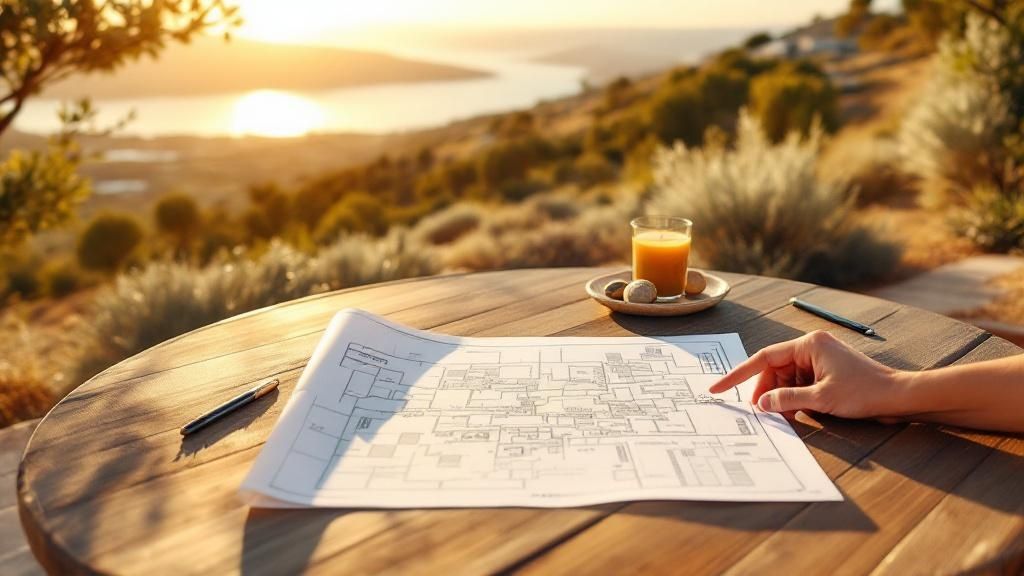
So, you're dreaming of buying land in Ibiza. Before you get lost in visions of your perfect island home, it's crucial to understand the ground rules. Buying a plot here isn't like buying property anywhere else. You're stepping into a unique ecosystem where intense demand collides with an incredibly scarce supply, all governed by strict regulations.
Success means navigating a maze of zoning laws, knowing the critical differences between rural and urban land, and, most importantly, putting together a solid team of local experts. Your lawyer and architect will be your most valuable assets in making sure your investment is both compliant and secure.
Getting to Grips with the Ibiza Land Market
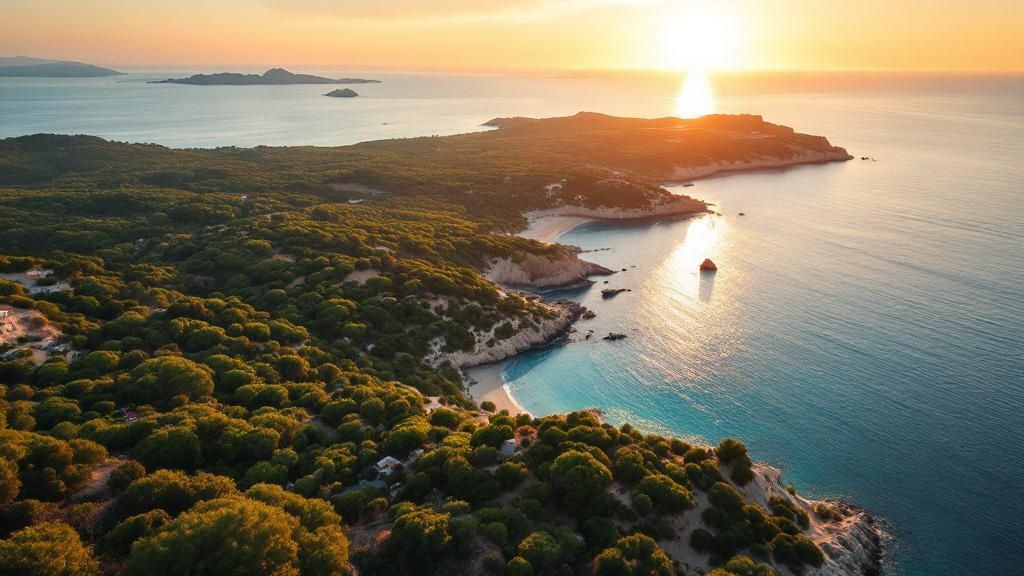
Before you even start looking at listings, take a step back. The Ibiza land market beats to its own drum. This isn't just another real estate play; it’s a tiny, powerful economy fueled by scarcity, global appeal, and a hard-earned reputation as a resilient investment. Getting a feel for this unique pulse is your first real step toward a smart purchase.
The island's charm is legendary, pulling in a discerning international crowd looking for that perfect blend of luxury, peace, and vibrant culture. This constant wave of demand crashes against a very finite supply of buildable land—a supply that's intentionally kept tight by local laws designed to protect Ibiza's natural soul.
It's this fundamental imbalance that keeps land values on a steady upward climb.
The Market's Rhythm: How Things Have Changed
For a long time, the market was a frantic seller's game. Things have shifted. We're now seeing a more mature, balanced environment. The post-pandemic frenzy has settled down, giving thoughtful, patient buyers a real chance to find value without the breakneck pressure of the last few years.
The numbers tell the story of this evolution. The Ibiza property market has been remarkably resilient, bouncing back hard after the 2017 post-crisis peak and surging through 2021-2022. By 2024, things started to stabilize. While sales across the Balearic Islands dipped by about 2.5%, average home prices in the region jumped by an impressive 9.4%—the highest rate in Spain. For a deeper dive, it's worth exploring some expert analysis on the 2025 Ibiza property market.
This trend—fewer sales but rising prices—is telling. It shows that while the mad rush has cooled, the inherent value of Ibiza property is stronger than ever. Buyers are more selective, and sellers are adjusting to a more normal, sustainable pace.
Key Takeaway: It's not about being the fastest anymore. Success in today's market comes from deep knowledge, strategic patience, and the ability to spot genuine value behind the premium price tags.
What Really Drives a Plot's Value?
When you buy land in Ibiza, you aren't just buying dirt. You're investing in a specific collection of traits that give it worth. To properly evaluate a plot, you need to think like a seasoned local.
Before you even start your search, it's helpful to have a clear framework. This table breaks down the most important factors you'll need to consider.
Ibiza Land Purchase Key Considerations
| Factor | Key Insight | Actionable Tip |
|---|---|---|
| Zoning & Buildability | This is everything. The classification—suelo rústico (rural) or suelo urbano (urban)—dictates if you can build and how much. | Get a cédula urbanística (zoning certificate) from the town hall for any serious contender. This is non-negotiable. |
| Location & Views | Proximity to towns, beaches, and marinas drives value. West coast sunset views command the highest premiums. | Don't just look at a map. Visit the plot at different times of day to experience the light, noise, and overall vibe. |
| Infrastructure Access | Utilities are not a given, especially in rural areas. The cost to connect water, electricity, and sewage can be enormous. | Request documentation proving legal access to water and electricity. If it's not there, get quotes for installation before you bid. |
| Privacy & Exclusivity | Secluded, private plots are the holy grail. The feeling of being in your own world is what many buyers are paying for. | Assess the surrounding plots. Are they built on? What are the local building regulations for your neighbours? |
Thinking through these points from the very beginning will help you move from simply comparing prices to conducting a sophisticated value analysis. It's the only way to operate in a market this competitive.
Cracking the Code: Ibiza's Legal and Zoning Labyrinth
Buying land in Ibiza is an incredible feeling, but that excitement comes with a serious responsibility: understanding the island's unique legal landscape. We're talking about a blend of Spanish national laws and, more critically, some fiercely protective local zoning regulations.
Getting this wrong isn't a small stumble. It can be a catastrophic, wallet-draining mistake that turns your dream into a bureaucratic nightmare. Let's walk through how to navigate this maze with confidence.
This isn't just a checklist; it's a journey. Think of it in three phases.
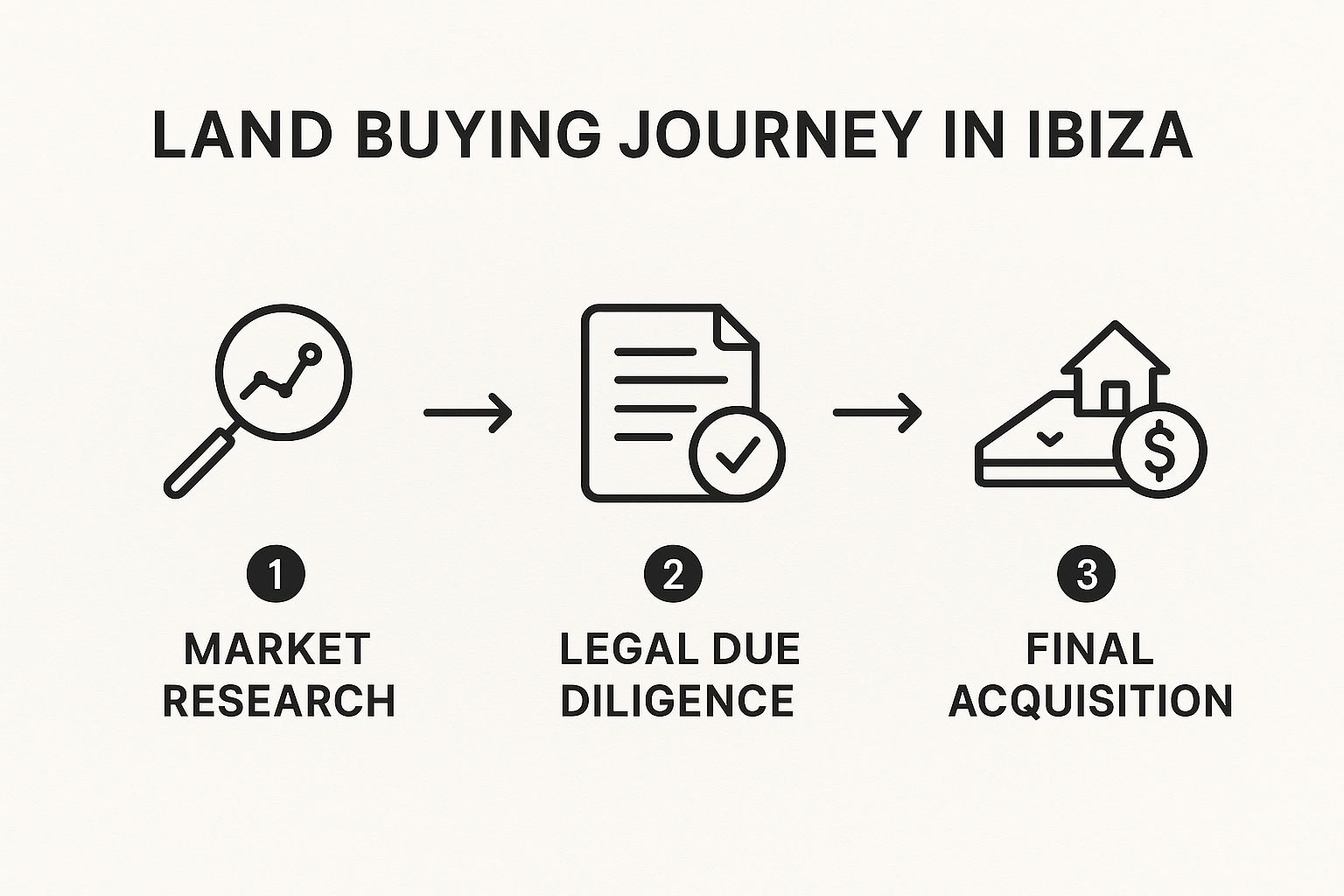
As you can see, the legal deep dive isn't just one step among many. It’s the essential bridge between finding a plot you love and actually making it yours. It’s what secures your investment.
First Things First: Your NIE Number
Before you can even think about making an offer, you need a Número de Identificación de Extranjero, better known as an NIE. This is your personal identification and tax number in Spain, and it's completely non-negotiable for buying property. Honestly, it's your golden ticket to the Spanish property market.
You can apply for your NIE at a Spanish consulate back home or handle it in person once you're in Spain. Be warned, the process can drag on for weeks, so my advice is to get the ball rolling on this as early as you can. Without it, you can't sign the final deed, open a Spanish bank account, or even connect utilities. It’s the foundational piece of paperwork you need to buy land in Ibiza.
The Big Divide: Suelo Rústico vs. Suelo Urbano
Now for the most important lesson in Ibiza real estate. The single biggest factor determining what you can build—or if you can build at all—is the land's zoning classification. Land on the island falls into two main categories, and confusing them is the most common and costly mistake I see foreign buyers make.
-
Suelo Urbano (Urban Land): This is land that's already earmarked for development. It's typically serviced with infrastructure like roads, water, and electricity, or it's planned to be. Building here is far more straightforward because it's already part of a town's development plan.
-
Suelo Rústico (Rural Land): This is the protected countryside, and "protected" is the key word. Building here is extremely difficult and heavily restricted to preserve Ibiza’s raw, natural beauty. You’ll generally need a massive plot—often 15,000 square meters or more—just to have a chance at getting a permit for one house. Even then, the home's size will be capped at a tiny fraction of the total land area.
A word of warning from experience: many buyers get tempted by a "bargain" price on a stunning piece of suelo rústico, assuming they can build their dream villa. The hard truth is that the vast majority of these plots can never be legally developed. Always, always have an architect confirm the specific local building rules for any rural plot before you even consider it.
Verifying the Paperwork That Matters
Once you’ve zeroed in on a plot, it’s time for your lawyer to earn their keep with thorough due diligence. They will dig into several key documents to make sure the land is clean and free of hidden problems. This isn't just a box-ticking exercise; it's your armour against future legal battles.
For any plot with an existing building, no matter how small, the Cédula de Habitabilidad (Certificate of Occupancy) is vital. This piece of paper confirms the structure is legal and fit to be lived in. If you find a plot with an old finca that lacks this certificate, you could be looking at an illegal build, which might come with a demolition order from the town hall.
If you plan to build on an empty plot, the key document is the Licencia de Obra (Building License). If a seller tells you a license is already in place or easily obtainable, don't take their word for it. Your lawyer needs to get independent, written confirmation directly from the local town hall (ayuntamiento). In Spain, verbal promises are worth nothing.
Imagine this real-world scenario: you buy a plot with a charming little casita, only to find out later it was built without a license and the town hall has an open enforcement file on it. That problem is now yours. This could mean thousands in fines or, in the worst case, being forced to tear it down. It happens more often than you'd think, which is why professional verification is non-negotiable.
Your legal team also has to check for any debts or liens on the property. In Spain, debts like unpaid property tax (known as IBI) or community fees are tied to the property itself, not the owner who racked them up. If you buy the land, you inherit their debt. A careful check at the Registro de la Propiedad (Land Registry) will expose any of these lurking liabilities, saving you from a nasty financial shock down the line.
Decoding the True Cost of Your Ibiza Dream
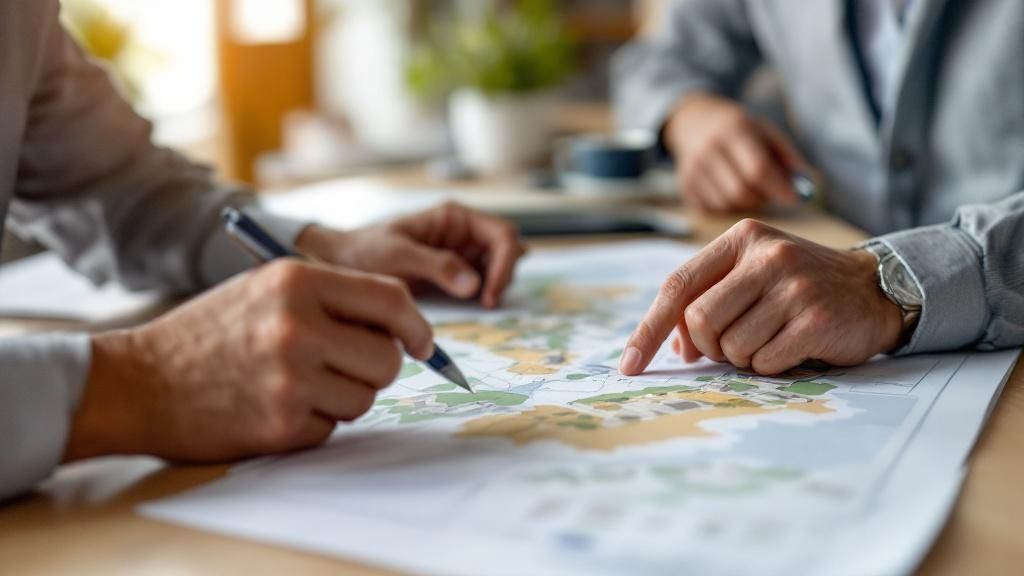
The price you see on a property listing? That’s just the beginning of the story. To successfully buy land in Ibiza, you need to get real about the total cost, not just the ticket price. All the extra fees, taxes, and professional services can tack on a significant amount to your initial investment—I usually advise clients to budget for an additional 10% to 13% of the purchase price.
Getting your budget right from day one is what separates a smooth purchase from a stressful scramble. This isn't just about numbers; it's about turning your vision into a solid financial plan, ensuring you have the capital to get from the initial offer to holding the keys in your hand.
The Two Big Purchase Taxes
When you buy a plot of land or a finished property in Ibiza, you’ll be hit with one of two major taxes. Which one depends entirely on whether you're buying a new build from a developer or a resale from a private individual.
- Property Transfer Tax (ITP): This is the tax you’ll almost certainly encounter when buying a plot of land, as most are considered resale properties. ITP is a regional tax managed by the Balearic government, and it’s calculated on a sliding scale.
- Value Added Tax (IVA or VAT): This tax applies when you're buying a brand-new property or a plot of land for the first time directly from a developer or business. For residential properties, IVA is a flat 10%.
One crucial detail: if your purchase is subject to IVA, you'll also have to pay another tax called Actos Jurídicos Documentados (AJD), which is essentially Stamp Duty. In the Balearics, this can add another 1.5% to 2.5% to your total cost.
Getting to Grips with ITP Rates
The Property Transfer Tax (ITP) isn't just a simple percentage. It’s progressive, meaning the rate increases as the property's value goes up. It's easy to miscalculate if you're not careful.
Here’s a breakdown of how the rates are tiered:
| Property Value | ITP Rate on This Portion |
|---|---|
| Up to €400,000 | 8% |
| €400,001 to €600,000 | 9% |
| €600,001 to €1,000,000 | 10% |
| €1,000,001 to €3,000,000 | 12% |
| Above €3,000,000 | 13% |
Let's run a quick, real-world example. Say you find the perfect plot for €800,000. Your ITP isn't a straight 10% of that figure. It’s calculated in chunks based on the table above, which would bring your total tax bill to around €70,000. That’s a hefty sum you need to have ready in cash.
Looking Beyond the Purchase Taxes
While taxes are the biggest slice of the pie, they aren't the only additional costs. Several professional fees are non-negotiable for a secure transaction. I’ve seen buyers overlook these and end up in a tight spot right before closing.
Make sure you have funds set aside for:
- Notary Fees: The notary is who makes the sale official and legally binding. Their fees are regulated by a government scale based on the property price, but you can expect to pay somewhere between €800 and €2,000.
- Land Registry Fees: This is the fee for officially registering the property in your name. It’s also based on a government scale and typically runs from €500 to €1,500.
- Lawyer Fees: In my experience, a good, independent lawyer is your most important asset in this process. Their fee, usually around 1% of the purchase price, is a small price for the security they provide by performing thorough due diligence.
Ongoing Costs and the Bigger Picture
The expenses don't stop once the deal is done. As a property owner in Ibiza, you'll have an annual property tax called Impuesto sobre Bienes Inmuebles (IBI). This local tax is based on the property's official assessed value (valor catastral) and generally falls between 0.4% and 1.1% each year, depending on the municipality.
Understanding these costs is vital, especially when you consider the island's hot market. By mid-2025, residential property prices in Ibiza had climbed to record highs, averaging €7,465 per square meter after a staggering 16.53% jump in just one year. This isn't a fluke; it reflects Ibiza's evolution into a year-round luxury destination, with international buyers fuelling prices that have soared by roughly 74% since 2017.
The takeaway is simple: Ibiza presents an incredible investment opportunity, but it’s a premium market. A detailed, comprehensive budget isn't just a good idea—it's your most essential tool for success.
The financial foresight needed to buy property here shares a lot of common ground with other high-value European hotspots. You can see how these dynamics compare by checking out our guide on the best countries to buy property.
Finding Your Perfect Plot on the Island
Ibiza isn't just one place; it's a mosaic of different lifestyles. The island’s character shifts dramatically from the high-octane glamour of the south to the quiet, bohemian spirit of the north. When you set out to buy land in Ibiza, you’re doing more than just picking a piece of dirt—you’re choosing your future.
So, the first real question to ask yourself is: what does your ideal life here look like? Are you dreaming of waking up to the sound of birds in the countryside, miles from the summer madness? Or do you see yourself a short walk from a bustling town, with its daily markets and café culture? Maybe nothing less than a frontline plot with those iconic Mediterranean views will do. Nailing down this vision is the first, and most important, step in your search.
A Tale of Two Ibizas: The North vs. The South
To find your spot, you first have to understand the island's distinct personalities. Each region has its own rhythm, its own community, and its own property market.
The Glamorous South (Ibiza Town, Talamanca, Es Cubells) This is the island’s glittering heart. It’s where you’ll find the world-class nightlife, designer boutiques, and superyacht marinas. Unsurprisingly, land here—especially with sea views—commands the highest prices. Areas around Ibiza Town and the exclusive hills of Es Cubells offer a sophisticated, jet-set lifestyle where everything is at your fingertips.
The Family-Friendly East (Santa Eulalia, Roca Llisa) Known for its year-round appeal, Santa Eulalia is a huge draw for families and anyone looking to make Ibiza their permanent home. It has a beautiful promenade, a well-regarded international school, and a more relaxed vibe than the south, while still being incredibly well-connected. The investment potential here is solid and stable.
The Famous West (San Antonio, San José, Cala Comte) Home to those legendary sunsets, the west coast is a fantastic mix of lively resort towns and breathtaking natural beauty. I often point people towards the areas around San José, which strikes a great balance. You get easy access to stunning beaches like Cala Comte and Cala Bassa, but with the charm of a more traditional village.
The Bohemian North (San Juan, San Miguel, Portinatx) The north feels like another world entirely. It's rugged, serene, and fiercely protective of its laid-back, bohemian soul. This is where you’ll find sprawling plots of rustic land (fincas), hidden coves, and a much slower pace of life. It’s the perfect escape for anyone seeking true tranquility and a deep connection to nature.
For many buyers, the choice between the vibrant south and the peaceful north is the single most defining decision. My advice? Don't rely on pictures. You have to spend time in these areas. Visit the local markets, drive the back roads, and just sit at a café to really feel the difference.
Location, Investment, and Price Dynamics
Where you choose to buy directly impacts the value and investment potential of your land. It's no secret that Ibiza's property values have skyrocketed, more than doubling in the last decade. This is fueled by intense international demand meeting a tightly constrained supply, thanks to strict land-use laws.
Prime locations have seen staggering growth. Santa Eulalia, for example, saw a 131% price jump over ten years. In early 2025, average prices in Ibiza Town hovered around €7,465 per square meter, with the most exclusive properties hitting €12,000 per square meter. While 2024 saw a 26% dip in the number of sales—likely as the market cooled from affordability pressures—this actually put more properties on the market for serious buyers. Forecasts for the rest of 2025 point to continued price growth of 5-10%, and luxury villas are still pulling in strong rental yields of 5-8% a year. You can read more about the forces shaping the Ibiza property market to get a deeper understanding.
This trend really drives home how critical your location choice is. Proximity to beaches, towns, and good infrastructure aren't just lifestyle perks; they are the engines that will power your investment's future value.
Matching Your Goals to a Location
Let's put this into practice. Here’s how different goals might lead you to different parts of the island:
- For the Investor Seeking Maximum Rental Returns: You should be focusing on the south or the most desirable pockets of the west coast. A plot near Ibiza Town, Talamanca, or with sunset views towards Es Vedrà will always be in hot demand for high-end holiday rentals.
- For the Family Putting Down Roots: Santa Eulalia is a top contender. Its community feel, excellent school, and year-round amenities make it a practical and wonderful base for family life on the island.
- For the Retiree or Anyone Seeking Peace and Quiet: The north is your sanctuary. A plot of land near the villages of San Juan or Santa Agnès offers the peace, privacy, and authentic countryside experience you’re looking for.
Ultimately, the 'best' plot of land is the one that clicks with both your personal vision and your financial goals. By getting to know the island’s distinct regions, you can make a smart choice that delivers not just a great investment, but a place you’ll be genuinely excited to call your own.
Building Your A-Team on the Island
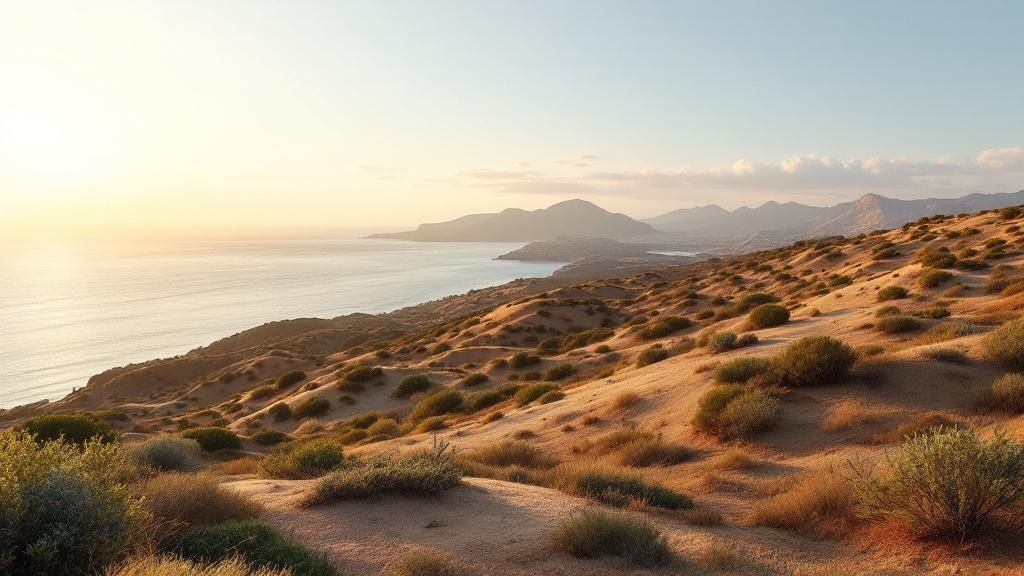
Let’s be blunt: trying to buy land in Ibiza without a local professional team is one of the biggest mistakes a foreign buyer can make. This isn't just about convenience. The island operates on a unique mix of strict regulations, unwritten local customs, and a fiercely competitive market. You need more than Google; you need a trusted, on-the-ground support system.
This isn’t simply about delegating tasks. It's about surrounding yourself with advisors who will protect your interests, cut through the red tape, and find opportunities that never appear on public websites. Think of them as your eyes, ears, and, most importantly, your shield against the legal and financial traps that are all too common here.
The Real Estate Agent Who Lives and Breathes Land
Your first contact will likely be a real estate agent, but you can't just pick anyone. You need a specialist who focuses on land sales (terrenos or solares), not just villa resales. They have a completely different skillset and network.
A true land expert understands zoning nuances, the logistical headaches of rural infrastructure, and has access to off-market plots before they hit the major portals.
When you're interviewing agents, get specific. Ask about their most recent land deals. A great agent won't just bombard you with listings; they’ll challenge your assumptions, suggest areas you hadn't considered, and be upfront about a plot's limitations. Their real value is in their deep, local knowledge, not just their property list.
A major red flag? An agent who pressures you or gets defensive when you mention legal due diligence. Your agent should be a partner to your lawyer, not see them as a roadblock to their commission.
Your Most Critical Ally: The Independent Lawyer
If there's one person on your team you absolutely cannot skimp on, it's an independent Spanish lawyer—an abogado—who specializes in property law. And I mean truly independent. Never, ever use a lawyer recommended by the seller or even the agent. You need someone whose only loyalty is to you. Their job is to be professionally paranoid on your behalf.
Your abogado will run exhaustive due diligence, checking everything from the seller's legal title to making sure no hidden debts or planning violations are tied to the land. In Spain, debts follow the property, not the person, so this single step can save you from inheriting a financial nightmare.
A quick story from the trenches: I once saw a lawyer's due diligence uncover an unrecorded right-of-way that would have allowed a neighbor to drive straight through the middle of my client's "private" dream plot. The agent never mentioned it. The abogado saved the client from a complete disaster.
Don't try to save money here. A lawyer's fee, usually around 1% of the purchase price, is the best investment you can make for your peace of mind and financial safety.
The Architect: Your Reality Check
Before you fall in love with a breathtaking sea view, you need an architect to tell you if you can actually build your dream home there. Bringing a local architect into the process early—sometimes even before you make an offer—is a game-changer when you want to buy land in Ibiza.
They are the ones who can pull the local town hall's planning regulations (Plan General de Ordenación) for that specific plot and give you clear answers.
Your architect will confirm:
- Buildability: Is this plot actually zoned for construction?
- Footprint: What is the maximum size of the house you're allowed to build?
- Restrictions: Are there height limits, style guidelines, or environmental protections to worry about?
- Utilities: What will it cost to connect water and electricity if the plot is off-grid?
Their initial report, an informe urbanístico, grounds your vision in reality. It’s the crucial step that prevents you from buying a beautiful but utterly useless piece of land. Choosing your team carefully is a fundamental principle of smart property acquisition, a common theme when looking into the best countries for property investment worldwide.
Common Questions About Buying Land in Ibiza
Diving into the Ibiza land market always sparks a lot of questions. It's completely natural. Getting straight, honest answers is the first step toward making a confident decision. Let's walk through some of the most common things people ask us.
Can Foreigners Legally Buy Land in Ibiza?
Yes, absolutely. Spain is very open to foreign investment in property. Whether you're from an EU country or from somewhere else in the world, the law gives you the same property rights as a Spanish citizen.
The one thing every single foreign buyer needs, without exception, is a Spanish NIE number (Número de Identificación de Extranjero). Think of it as your official ID and tax number in Spain. You literally can't do anything without it—not sign the deed, not pay your taxes, not even open a bank account or get the electricity turned on.
What Are the Building Rules for Rural Land?
This is where things get tricky. Building on what the Spanish call suelo rústico (rural land) is heavily restricted, and for good reason. The island's government is fiercely protective of Ibiza's natural landscapes and works hard to prevent urban sprawl.
As a general rule, you’ll need a huge plot of land just to have a chance at getting a building license. We're often talking a minimum of 15,000 square meters, and in some protected areas, it can be much more. Even if you have the minimum acreage, the house you can build will be limited to a tiny fraction of the total land size.
It's essential to have a local architect independently verify the specific building regulations for any rural plot before you even think about making an offer. Don't take anyone else's word for it.
How Long Does the Purchase Process Take?
Once your offer is accepted, you can expect the entire buying process to take somewhere between 6 and 12 weeks. This timeline isn't arbitrary; it gives everyone enough time to handle all the critical legal and financial steps correctly.
Here’s what that period typically involves:
- Due Diligence: Your lawyer will be busy doing a deep dive into the property's legal history. They'll check for any hidden debts, liens, or planning issues that could come back to haunt you.
- Private Purchase Contract: You’ll sign a preliminary contract called a contrato de arras. This is when you'll pay a deposit, usually 10% of the agreed price, to officially take the property off the market.
- Signing the Final Deed: The final step happens at a notary's office. You'll sign the public deed of sale (escritura de compraventa), pay the remaining balance, and get the keys. At that moment, the land is officially yours.
The journey to owning land in Ibiza can be part of a bigger dream, like finding the perfect place to settle down. If you're weighing your options across the continent, you can learn more by reading about the best places to retire in Europe and see how the White Isle stacks up.
At Residaro, we simplify the search for your ideal European property. Explore our curated listings of villas, apartments, and country homes in Spain and beyond at https://residaro.com.